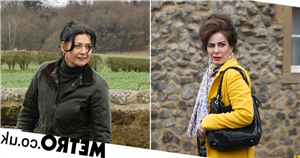Emmerdale star reveals what happens next for Faith after cancer diagnosis

Faith Dingle (Sally Dexter) in Emmerdale has been left reeling following the news her breast cancer has returned.
Following weeks when Faith’s bad behaviour and drunken antics have been the talk of the village, we learnt that she was secretly worried sick about her health.
Finally Moira (Natalie J. Robb) forced her to admit what was wrong, and went with Faith to her hospital appointment.
Sally Dexter talked to Metro.co.uk about the emotional scenes where her character is given the bad news. ‘I think she’s absolutely shell-shocked, her response is numb. She can’t take it in,’ she says. ‘And in a sense, Moira being there relieves her of having to react. It’s Moira who reacts emotionally; and funnily enough, I think when somebody else cries or is emotional, you aren’t. Well, certainly it is with me, it does tend to get passed over to them. In a way Moira takes that baton from her and takes the responsibility of the emotional-ness of it, and Faith is just sitting there. In some ways it’s not a good thing, because really, if Faith was on her own with the oncologist, I think there would have been a different reaction.’
Sally says that Faith was half expecting the news. ‘I think it was strongly on her mind. I’ve heard a lot of people say that. It’s sort of in the back of your mind that “Yes, I’m cured, but is it going to come back?”’
Now that Faith knows the truth, it becomes a debate with Moira about who to tell and when. ‘Faith tries very hard to convince Moira that it’s not right for her to be the person to tell anybody else, that’s it actually Faith’s choice what she does,’ Sally explains. ‘It’s that thing of having control over your life in some way. If you can’t control the cancer, if you can’t control other aspects of your life, at least you can control the choices you make. And this becomes a fundamental and ever-growing thought in Faith’s mind – that she wants to take control.’
She says these scenes were very emotional to film. ‘It’s a question of holding it back, and back, and back; because they do a wide shot, they do a mid-shot, they do a long shot and then they come in for a close up. So you’ve done the same point of emotion about six times before you come to the point where you’ve got to really let it rip, so that can be challenging! Because some of the scenes are so well-written, that it’s difficult not to just have a gut reaction to them from the word go, and let that run out.’
Source: Read Full Article

